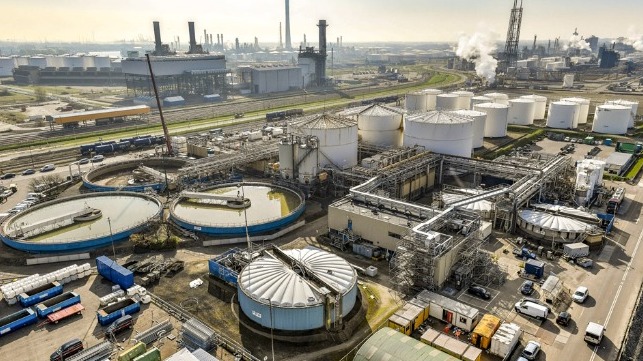Shell to Build One of Europe’s Biggest Biofuels Facilities

Royal Dutch Shell is proceeding with plans to build one of Europe’s biggest biofuel facilities as part of its effort to convert traditional facilities to the emerging green energy markets. Located in Rotterdam, the plant will produce sustainable aviation fuel (SAF) and renewable diesel made from waste that can be used to help the transportation sectors achieve decarbonization.
As part of its Powering Progress strategy, Shell is transforming its refineries (which numbered 14 in October 2020) into five energy and chemicals parks. Shell aims to reduce the production of traditional fuels by 55% by 2030 and provide more low-carbon fuels such as biofuels for road transport and aviation, and hydrogen.
Formerly known as the Pernis refinery, the Energy and Chemicals Park Rotterdam is the second park to be announced by Shell, following the launch in July of the Energy and Chemicals Park Rheinland, in Germany. Shell made the final investment decision to build an 820,000-tonnes-a-year biofuels facility at the Shell Energy and Chemicals Park Rotterdam, the Netherlands. The Rotterdam biofuels facility is expected to start production in 2024. It will produce low-carbon fuels such as renewable diesel from waste in the form of used cooking oil, waste animal fat, and other industrial and agricultural residual products.
“Today’s announcement is a key part of the transformation of one of our major refineries into an energy and chemicals park, which will supply customers with the low-carbon products they want and need,” said Huibert Vigeveno, Shell’s Downstream Director.
Production at the new facility will be split between renewable diesel that can be used in the transportation segment and sustainable aviation fuel. Shell can adjust this mix to meet customer demand.
A range of certified sustainable vegetable oils, such as rapeseed, will supplement the waste feedstocks until even more sustainable advanced feedstocks are widely available. The facility will not use virgin palm oil as feedstock.

that matters most
Get the latest maritime news delivered to your inbox daily.
Marjan van Loon, President Director of Shell Netherlands BV said: “This investment is an important step as we transform the Energy and Chemicals Park Rotterdam from a traditional refinery into a sustainable energy park. The project will mean hundreds of millions of dollars of investment each year during construction, it will create hundreds of jobs, and help to maintain the facility’s competitiveness for years to come.”
To further increase the environmental performance of the facility, Shell expects to use technology to capture carbon emissions from the manufacturing process and store them in an empty gas field beneath the North Sea through the Porthos project. A final investment decision for Porthos is expected next year.
